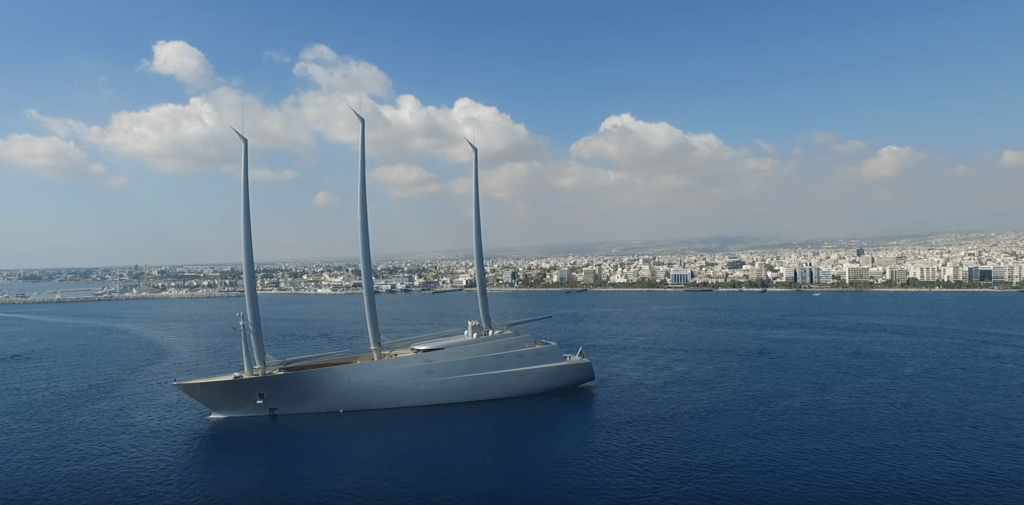“To think how far we have come” boasted a tweet from Cyprus last month “…to be servicing Yacht-A @LimassolMarina” referring to the arrival of the Philippe Stark designed super-yacht off the shores of the Mediterranean island.
The metaphorical distance traveled is meant to imply how this once quaint haven of fishing boats and victim of crusader fleets now attracts and services the mega-toys of the super-rich – in this case of Russian coal and fertilizer industrialist Andrey Melnichenko.
 The giddiness of the corporate PR machinery evokes the delight a star-struck New York hot-dog vendor might feel for serving the occasional celebrity passer-by.
The giddiness of the corporate PR machinery evokes the delight a star-struck New York hot-dog vendor might feel for serving the occasional celebrity passer-by.
Cyprus’ GDP stands just fractionally above Melnichenko’s net worth of $23 billion. His slick 143-meter yacht cost $600 million and has an annual running cost of $50m1. Whenever he is around, a small portion of that accrues to Cyprus.
Nothing unusual there. Indeed it’s very much business as usual for a country that was on the brink of financial collapse only a decade ago. In a desperate attempt to remain afloat Cyprus sought to attract new investors and their vessels and exploited a passport-for-property sale scheme (now suspended) that fueled a construction boom of marinas and skyscrapers. The stuff of ‘economic miracles.’ Yet, while the country is guilty of its share of shady lawyers and accountants, the keepers of billionaires’ secrets, it is fair to say that it is not the only one. An estimated 10 percent of the world’s wealth is ‘parked’ in offshore tax-avoiding jurisdictions some of them reputable G20 capitals.
But the bottom line is that Cyprus has capitulated to the worst of capitalism; and it shows. The scarring of the land and the inequality these practices have brought are now visible. While their government speaks of growth the younger generation cannot afford the rents in their hometown as hoards of loaded oligarchs descend on their city.
Aristotle’s ‘rule by the few,’ oligarchia, today expresses the influence wealthy Russian individuals exert on politics. Mostly bankers and commodity traders, right-place-right-time types who amassed huge wealth from the fast privatization of Soviet state enterprises. From oil and gas to coal and steel came financialized fortunes, hidden in layers of trusts and moved around the globe.
And few they are not. In the case of Russia there are dozens on the EU-US sanctions blacklist alone (for the record Melnichenko is not on such a list)2. Neither it must be said is oligarchy a strictly Russian affair. Mark Zuckerberg and Jeff Bezos also fit the Aristotelian classification. In fact their wealth makes their Russian comrades look beggarly. They too wield disproportionate influence, have easy access to the corridors of power and as supreme tech-oligarchs have a very direct say over people’s lives.
Zuckerberg’s client base is a third of the world’s population3. Mr Bezos owns the most dominant online store in the world and is worth approximately $205 billion. For a few minutes of megalomaniac weightlessness he shot himself into space in an anthropomorphic torpedo which it must be said has much to learn from Melnichenko’s designer. Those few minutes cost around $5.5 billion and released fumes into the stratosphere that will persist for at least two years.4
The paradox with oligarchs is the secrecy with which they move their money and the pretentiousness with which they showcase it. The problem for us is that governments in crisis succumb to their will. Small and economically weakened states like Cyprus turn a blind eye to their unchecked wealth and long for a share.
David Pilling in his book, The Growth Illusion5, said “Economic growth has become a fetish, a proxy for everything we are supposed to care about and an altar on which we are prepared to sacrifice all’. The culmination of what Mark Fisher had called Capitalist Realism6 that “widespread sense that not only is capitalism the only viable political and economic system but also that it is now impossible even to imagine a coherent alternative to it”.
Earlier this month a loud alarm in Glasgow thrust a hybrid alternative upon us. And while COP26 failed to garner the support necessary for real and immediate progress, its failure may turn out to be more useful than its success might have been. Had leaders reached an agreement they would have gloated and then hypnotized us for another decade of pledges and metrics that they would never have met.
By failing to curb the greed of their polluting industrialists they have awakened and alienated the world. None more deeply than a younger and no longer silent generation, desperate for a greener egalitarian future.
While the globetrotting oligarchy and the presidents they invite on their jets and yachts fail to see the pain of the lands and seas, an impatient global citizenry is seeing it more clearly and feeling it more directly. From Al Gore’s Inconvenient Truth to Greta’s school strike and now the fall-out from Glasgow it is global environmental consciousness that has come a long way.
COP26’s failure has just gifted it a louder voice.
1 https://www.superyachtfan.com/yacht/sailing-yacht-a/
2 Pandora Papers investigation: https://www.washingtonpost.com/world/interactive/2021/us-russia-sanctions/
3 https://www.statista.com/statistics/264810/number-of-monthly-active-facebook-users-worldwide/
5 https://crownpublishing.com/archives/news/growth-delusion-wealth-poverty-well-nations-david-pilling
6 https://bookshop.org/books/capitalist-realism-is-there-no-alternative/9781846943171
